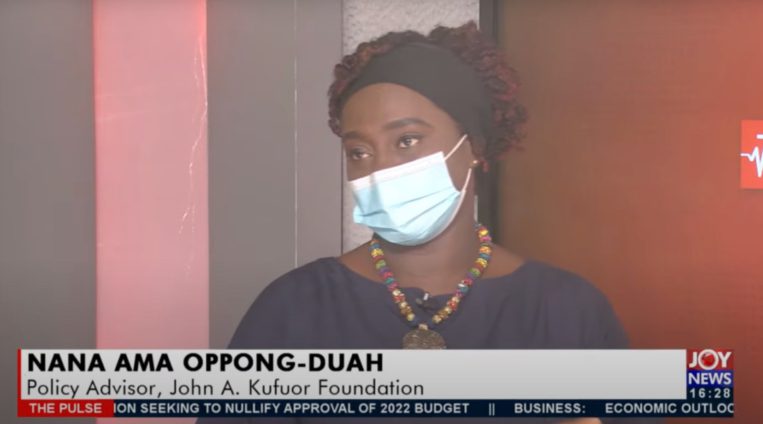The John A. Kufuor Foundation is calling on government and the private sector to expand investment in mechanisation services for farmers if the country can become self–sufficient in rice production.
Nana Ama Oppong – Duah, who is Policy Advisor at the Foundation, told Aisha Ibrahim on The Pulse Show on Joy News that the only way to ensure Ghana rice becomes widely available to all Ghanaians is to ensure mechanisation tools are available to smallholder farmers who don’t have the capital to afford.
“Rice is not like any other crop… Rice needs very even land that has been well prepared where the lumps are all broken down, and it is relatively flat. And that’s why rice is special and requires quite a bit of mechanisation, and it also needs water,” she said.
“You need the tractors, threshers, irrigation facilities. It’s very easy to buy a tractor. But what takes time is putting in place irrigation infrastructure and preparing the land so you can plant on it. She observed that land development for rice is expensive, and irrigation is expensive,” she observed.
“The private sector can develop mechanisation equipment like combine harvesters, tractors, tillers. But the government needs to pay attention to irrigation infrastructure. And there are issues with land development that government needs to take the lead on. Then the private sector can help with the milling, storage, and marketing,” Madam Oppong – Duah added.
She says a better financing regime for farmers to acquire such mechanisation facilities is needed. “The financing is a problem. Where do I get the tractor? The farmers are not able to buy them. The government needs to come up with the funding mechanism so farmers can get the support,” she noted.
“We need to make sure we put in place these funding mechanisms, leasing arrangements, irrigation infrastructure and land development,” she noted.
Madam Oppong – Duah observed that Ghana can produce more than enough rice to feed the country if mechanisation is prioritised. “Accra plains alone can feed the country. Even in Cape Coast, there is land. It’s just getting it ready and getting water; that is where the challenge is,” she said.
“In the light of Covid, it will be good to reduce face-to-face interaction. One person can work on several acres if you have tractors, combined harvesters, and planters. If we want to be self-sustainable, we need to mechanise,” she noted.
The Foundation is currently working with the Alliance for a Green Revolution in Africa (AGRA), the Ministry of Food and Agriculture, Hopeline Institute, Sparkx Farms and Volta City Farms to implement an initiative to make Ghana self-sufficient in rice production.
“We have certified over 242 mechanisation service providers in collaboration with the Agricultural Engineering Services Department of MOFA. We have mapped the service providers to these areas, so it’s easy for them to find the farmers… And then with Hopeline Institute, we are launching a one-stop service for all the mechanisation service inputs,” she added.
Latest Stories
-
Empowering Girls in ICT: FAWE Ghana advocates for gender equality in the Tech sector
1 hour -
Rangnick ‘contacted by Bayern Munich’ about manager job
1 hour -
Winneba Youth Choir celebrates 35th Anniversary with Aseda Concert sponsored by Fidelity Bank
1 hour -
Bonwire residents reject Agya Koo’s endorsement of Ejisu NPP MP aspirant
1 hour -
SSNIT to run out of reserves due to deficits – ILO
1 hour -
Lagos officials eye Jospong Group’s eco-friendly waste management module
1 hour -
Photos: NDC outdoors Prof Naana Opoku-Agyemang as running mate
1 hour -
Tevez released from hospital after chest pains
1 hour -
EU expresses confidence in Ghana’s rejection of Anti-LGBTQI legislation
2 hours -
UK to improve access to life-saving malaria drugs for the most-affected countries
2 hours -
Newey to leave Red Bull over Horner allegations
2 hours -
Fifa announces deal with Saudi oil company Aramco
2 hours -
Free SHS: It takes time to review a policy – Tsiboe-Darko
2 hours -
Spanish prosecutors ask judge to scrap case against PM Pedro Sánchez’s wife
2 hours -
Kwabena Fori releases ‘Let Me Go’ ahead of ‘Tuesday’ EP
2 hours

